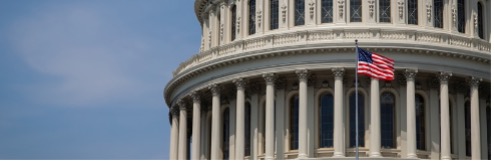Support Requested: ‘Do Not Flush’ Bill Introduced in Congress
Last month, the WIPPES Act was reintroduced in the House and Senate on bipartisan basis. The legislation, H.R. 2269 and S. 1092, reflects legislation that passed the U.S. House of Representatives last Congress and continues to mirror California’s “Do Not Flush” labeling law requirements for nonflushable wipes that CASA championed. This Congress, the WIPPES Act is sponsored by Representative Lisa McClain (R-MI) and Representative Kevin Mullin (D-CA), with Representative Jared Huffman (D-CA) as an original cosponsor. In the Senate, Senators Jeff Merkley (D-OR) and Susan Collins (R-ME) continue to sponsor the bill, with Senator Alex Padilla (D-CA) as an original cosponsor.
CASA continues to lead the diverse and growing stakeholder coalition to advance the WIPPES Act, with representatives from industry, the clean water, environmental advocates and civil engineer sectors. Due to the WIPPES Act’s straightforward and reasonable policy, as well as the cross-sector support, the House Committee on Energy and Commerce favorably reported out H.R. 2269 to the House Floor on a bipartisan voice-vote during its markup earlier this month. Ahead of the markup, CASA and the broader coalition group submitted a letter in support for H.R. 2269 for the committee’s record. H.R. 2269 currently awaits to be schedule for debate and vote on the House Floor after Congress returns from recess at the end of the month.
To ensure the WIPPES Act passes the House on a bipartisan basis, CASA members are encouraged to send your congressional delegations letters of support for the bill. A template support letter can be accessed here to send to your congressional offices. Letters should be sent up to congressional offices from now until June.
If you have any questions, you can reach out to CASA’s federal analyst, Sarah Sapirstein ssap@ensresources.com.
EPA Office of Water Head Nomination Advances to Senate Floor
 Earlier this month, the Senate Committee on Environment and Public Works considered and advanced the nomination of Jessica Kramer to be the Assistant Administrator for the Office Water at the U.S. Environmental Protection Agency (USEPA). The committee advanced Kramer’s nomination on a vote of 15-4, with Senator Alex Padilla (D-CA) and Senator Adam Schiff (D-CA) voting in favor of the nomination. A date for Floor consideration of Kramer’s nomination has yet to be announced. If confirmed, Kramer would lead the office in charge of setting and advancing USEPA’s clean water and drinking water policy and regulatory initiatives under the Trump Administration. This includes implementing the Clean Water and Safe Drinking Water Acts, addressing PFAS contamination in water resources and water quality treatment requirements.
Earlier this month, the Senate Committee on Environment and Public Works considered and advanced the nomination of Jessica Kramer to be the Assistant Administrator for the Office Water at the U.S. Environmental Protection Agency (USEPA). The committee advanced Kramer’s nomination on a vote of 15-4, with Senator Alex Padilla (D-CA) and Senator Adam Schiff (D-CA) voting in favor of the nomination. A date for Floor consideration of Kramer’s nomination has yet to be announced. If confirmed, Kramer would lead the office in charge of setting and advancing USEPA’s clean water and drinking water policy and regulatory initiatives under the Trump Administration. This includes implementing the Clean Water and Safe Drinking Water Acts, addressing PFAS contamination in water resources and water quality treatment requirements.
Executive Branch Issues New Directives to Review Federal Regulations
 The White House has issued a new Presidential Memorandum titled Directing The Repeal of Unlawful Regulations, tasking federal agencies with identifying and repealing regulations that may be unlawful. Citing recent and landmark U.S. Supreme Court decisions—most notably Loper Bright Enterprises v. Raimondo and Sackett v. EPA—the directive limits agencies’ authority to regulate beyond what is expressly authorized by statute. Agencies have 60 days to identify such rules and submit repeal plans. In tandem, the Office of Management and Budget released a separate Request for Information (RFI), inviting public input on deregulatory ideas through May 12, 2025.
The White House has issued a new Presidential Memorandum titled Directing The Repeal of Unlawful Regulations, tasking federal agencies with identifying and repealing regulations that may be unlawful. Citing recent and landmark U.S. Supreme Court decisions—most notably Loper Bright Enterprises v. Raimondo and Sackett v. EPA—the directive limits agencies’ authority to regulate beyond what is expressly authorized by statute. Agencies have 60 days to identify such rules and submit repeal plans. In tandem, the Office of Management and Budget released a separate Request for Information (RFI), inviting public input on deregulatory ideas through May 12, 2025.
This month, the White House published a new Presidential Memorandum entitled Directing The Repeal of Unlawful Regulations that directs heads of executive departments and agencies to review and identify unlawful or potentially unlawful regulations. A fact sheet of the Memorandum was also published by the White House. Agencies’ will evaluate the regulations’ lawfulness based upon the Memorandum’s cited US Supreme Court (SCOTUS) decisions:
- Loper Bright Enterprises v. Raimondo, 603 U.S. 369 (2024)
- West Virginia v. EPA, 597 U.S. 697 (2022)
- SEC v. Jarkesy, 603 U.S. 109 (2024)
- Michigan v. EPA, 576 U.S. 743 (2015)
- Sackett v. EPA, 598 U.S. 651 (2023)
- Ohio v. EPA, 603 U.S. 279 (2024)
- Cedar Point Nursery v. Hassid, 594 U.S. 139 (2021)
- Students for Fair Admissions v. Harvard, 600 U.S. 181 (2023)
- Carson v. Makin, 596 U.S. 767 (2022)
- Roman Cath. Diocese of Brooklyn v. Cuomo, 592 U.S. 14 (2020)
For CASA agencies, the key SCOTUS decisions to highlight are the Sackett and Loper Bright Enterprises decisions. To comply with the Memorandum, departments and agencies have 60 days to identify such regulations and develop plans to repeal them. Within 30 days of the end of the review period, agencies and departments will be submit to the Office of Information and Regulatory Affairs summaries of each regulation identified.
In addition to the new Memorandum, the Office of Management and Budget (OMB) issued a new Notice of Request for Information (RFI). This is important for CASA agencies to be aware of because while the RFI is separate from the above Memorandum, it aims to identify similar information and make similar deregulatory determinations as the Memorandum. Under the RFI, OMB is soliciting information on deregulation suggestions regarding all current federal regulations in effect and will be accepting public comments until May 12, 2025. In the Notice’s supplementary information section, OMB explains the RFI is seeking proposals rescinding or replacing regulations that are unnecessary, unlawful, unduly burdensome, or unsound. Specifically, regulations that are inconsistent with statutory text or the Constitution, costs exceed benefits, outdated, or burdensome to U.S. businesses.




 @CASA_CleanWater
@CASA_CleanWater